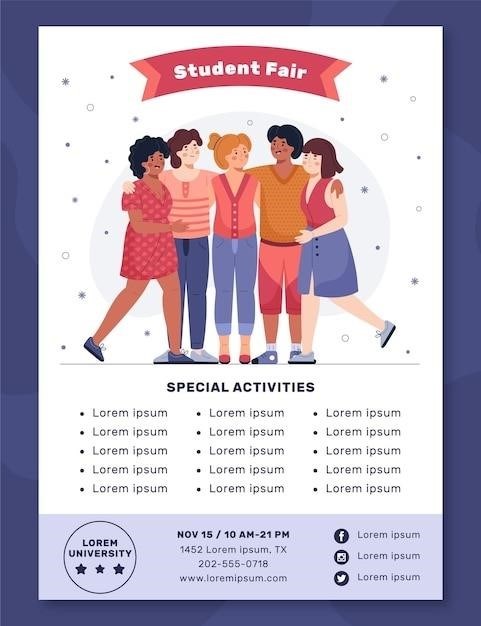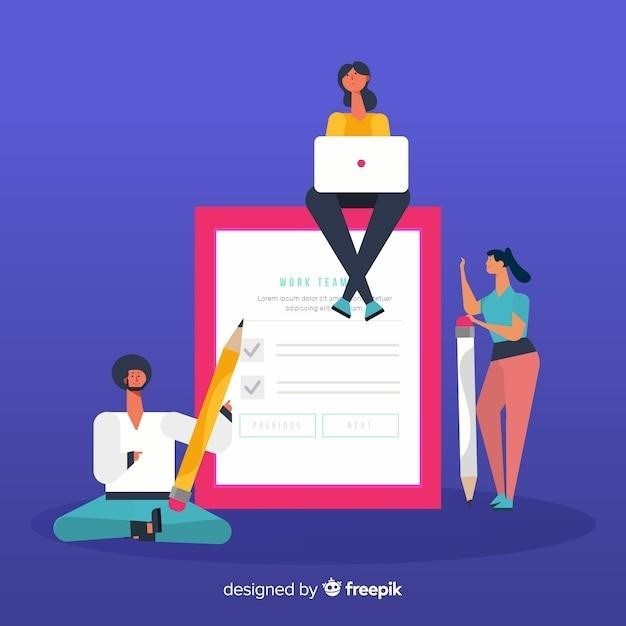7 Effective Habits of a Teenager⁚ A Comprehensive Guide
This guide explores seven effective habits for teenagers, adapted from Sean Covey’s “7 Habits of Highly Effective Teens,” offering practical strategies for academic success, improved relationships, and enhanced well-being during adolescence’s challenges.
Habit 1⁚ Be Proactive
Proactivity means taking responsibility for your choices and actions, rather than blaming external factors. It’s about focusing on what you can control. Instead of reacting to situations passively, a proactive teen anticipates challenges and plans accordingly. This involves setting personal goals, managing time effectively, and making conscious decisions that align with your values. For example, instead of complaining about a difficult assignment, a proactive teen would create a study plan and seek help if needed. This approach fosters self-reliance, resilience, and a sense of empowerment, enabling teens to navigate the complexities of adolescence with greater confidence and success. Proactive teens are problem-solvers, not just problem-identifiers.
Habit 2⁚ Begin with the End in Mind
This habit encourages envisioning your future self and defining your personal values and goals. Before making decisions, consider their long-term impact. Ask yourself⁚ What kind of person do I want to be? What are my aspirations? By visualizing your ideal future, you can make choices today that align with that vision. This might involve setting academic goals, planning for future careers, or defining personal values that guide your behavior. For instance, if your goal is to attend a specific university, you’ll need to maintain good grades and participate in relevant extracurricular activities. This proactive approach ensures that daily actions contribute to your overall life plan, creating a sense of purpose and direction. It’s about aligning your present actions with your future aspirations.
Habit 3⁚ Put First Things First
Prioritization is key. This involves identifying important tasks and scheduling them before less urgent activities. Effective time management is crucial; create a schedule or to-do list to organize your day. Learn to distinguish between urgent and important tasks. While some tasks might demand immediate attention, focusing on important tasks that contribute to long-term goals should be prioritized. For example, studying for exams is more important than watching TV, even if the latter feels more appealing. This involves discipline and self-control; avoid procrastination and learn to say “no” to non-essential activities that could distract you from your priorities. By consistently prioritizing important tasks, you’ll achieve greater success in your academic pursuits and personal life, creating a more balanced and productive schedule.
Habit 4⁚ Think Win-Win
This habit emphasizes collaboration and mutual benefit in relationships. It’s about seeking solutions where everyone involved feels successful. Instead of competing, strive for cooperation. In group projects, for instance, actively contribute and support your team members to achieve a shared goal. Compromise is key; be willing to negotiate and find common ground, even when it requires some personal concessions. This approach strengthens relationships and fosters a positive environment where everyone feels valued and respected. Remember, a “win-win” scenario benefits all parties involved, leading to stronger bonds and collaborative success in various aspects of life, from friendships to teamwork.
Habit 5⁚ Seek First to Understand, Then to Be Understood
Effective communication is crucial. Before expressing your own opinions or needs, make a genuine effort to understand others’ perspectives. Active listening is key⁚ pay attention, ask clarifying questions, and reflect back what you hear to ensure understanding. Empathy plays a vital role; try to see things from their point of view, even if you don’t agree. Once you’ve truly grasped their perspective, you can more effectively communicate your own thoughts and feelings. This approach builds trust, fosters stronger relationships, and prevents misunderstandings. By prioritizing understanding, you create space for productive dialogue and mutually beneficial resolutions.

Overcoming Challenges with Effective Habits
This section explores how the 7 habits can help teens navigate common adolescent hurdles, fostering resilience and promoting overall well-being.
Academic Pressures and Time Management
Academic pressures are a significant challenge for teenagers. Effective time management is crucial for success. Prioritizing tasks and using planning tools like calendars or to-do lists can help. Breaking down large assignments into smaller, more manageable steps reduces overwhelm. Students should aim for consistent study habits, creating a dedicated study space free from distractions. Utilizing study techniques such as the Pomodoro method can boost focus and efficiency. Regular breaks are essential to avoid burnout. Seeking help from teachers or tutors when needed is a sign of strength, not weakness. Remember, balance is key – maintaining a healthy social life and pursuing extracurricular activities is important for overall well-being and reduces stress.
Navigating Social Dynamics and Relationships
Teenage years are a time of significant social change. Developing strong communication skills is vital for navigating friendships, family relationships, and romantic involvements. Learning to actively listen and empathize helps build stronger connections. Assertiveness, expressing needs and boundaries respectfully, is crucial for healthy relationships. Understanding different perspectives and resolving conflicts constructively are essential life skills. Maintaining healthy relationships requires effort and compromise. Setting realistic expectations, understanding that friendships evolve, and accepting that not all relationships will last are important aspects of social maturity. Building a supportive network of friends and family provides emotional resilience during challenging times.
Managing Emotions and Mental Well-being
The teenage years are marked by a rollercoaster of emotions. Developing emotional intelligence, the ability to understand and manage your feelings, is crucial for mental well-being. Practicing mindfulness, focusing on the present moment, can help reduce stress and anxiety. Identifying and expressing emotions in healthy ways, such as through journaling or talking to a trusted adult, is essential. Seeking professional help when needed is a sign of strength, not weakness. Prioritizing self-care activities, including sufficient sleep, regular exercise, and a balanced diet, supports emotional regulation. Establishing a routine and creating a supportive environment helps maintain emotional stability. Learning effective coping mechanisms for stress and challenges, like deep breathing exercises, contributes to overall mental health. Remember, prioritizing mental well-being is an investment in a happier and healthier future.
The Power of Habit Formation
Understanding how habits form—the habit loop—is key. Building positive habits requires conscious effort, repetition, and self-discipline for lasting change.
Understanding the Habit Loop
The habit loop, a cornerstone of behavior change, consists of three stages⁚ cue, routine, and reward. A cue triggers the behavior; this could be a time of day, a location, or an emotional state. The routine is the actual habit itself – studying, exercising, or checking social media. The reward is the positive reinforcement that strengthens the loop, making you more likely to repeat the routine. Understanding these components allows teenagers to identify their existing habits and consciously modify cues and rewards to build positive routines. For example, if the cue is boredom and the routine is excessive screen time, a teenager could replace the reward of instant gratification with a more fulfilling activity like reading or spending time with friends.
Building Positive Habits
Building positive habits requires a strategic approach. Start small⁚ instead of aiming for drastic changes, focus on incorporating one new habit at a time. Make it easy⁚ reduce friction by setting up your environment to support the new habit. For instance, if you want to read more, keep a book by your bed. Track your progress⁚ using a journal or app helps monitor your success and identify areas needing improvement. Find an accountability partner⁚ sharing your goals with a friend or family member can provide encouragement and support. Reward yourself⁚ celebrate milestones to reinforce positive behavior. Remember consistency is key; even small, consistent efforts lead to significant long-term changes. Don’t be discouraged by setbacks; view them as learning opportunities and adjust your strategy accordingly.
Sustaining Positive Change
Maintaining positive habits requires ongoing effort and self-reflection. Regularly review your progress and adjust your strategies as needed. Life changes, and your approach to habit maintenance should adapt accordingly. Build in flexibility⁚ unexpected events will occur, so develop a plan to navigate potential disruptions to your routine. Seek support⁚ connect with friends, family, or mentors who can provide encouragement and accountability. Celebrate successes⁚ acknowledge your achievements to maintain motivation. Focus on the benefits⁚ remind yourself of the positive outcomes of your habits to stay committed. Don’t be afraid to ask for help⁚ if you struggle to maintain a habit, seek guidance from a therapist or counselor. Remember that building lasting positive change is a journey, not a destination, requiring continuous effort and self-compassion.

Resources and Further Reading
Explore Sean Covey’s “7 Habits of Highly Effective Teens” and other resources on teen development for further insights and practical advice.
Sean Covey’s “7 Habits of Highly Effective Teens”
Sean Covey’s “7 Habits of Highly Effective Teens” offers a comprehensive guide for teenagers navigating the complexities of adolescence. Adapting his father’s principles from “The 7 Habits of Highly Effective People,” Covey provides a relatable and engaging framework for personal growth. The book emphasizes proactive behavior, goal setting, prioritizing tasks, and building strong relationships. Readers learn to cultivate win-win situations, understand others before seeking to be understood, and synergize with those around them. Numerous online resources and discussions further support the book’s practical application, making it a valuable tool for teens seeking self-improvement and success. The book’s popularity and widespread use highlight its enduring relevance and impact on adolescent development. Many consider it an essential guide for teens aiming to lead fulfilling and successful lives.
Additional Books and Articles on Teen Development
Beyond Covey’s work, a wealth of resources exists to support teen development. Numerous books explore adolescent psychology, offering insights into navigating social dynamics, managing emotions, and building resilience. Articles in peer-reviewed journals provide research-based strategies for fostering healthy habits and coping mechanisms. Websites and online platforms offer practical advice, interactive tools, and support networks for teens and their families. These resources address various aspects of teen life, including academic pressures, mental health, identity formation, and relationships. Exploring these diverse sources provides a holistic understanding of teenage development, complementing the principles outlined in “7 Habits of Highly Effective Teens” and offering tailored approaches to individual needs and challenges. Utilizing these resources can empower teenagers to navigate their unique journeys with greater confidence and success.



